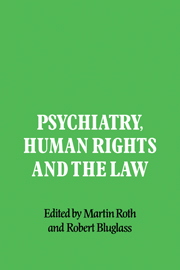Book contents
- Frontmatter
- Contents
- Editors' preface
- Contributors
- The historical background: the past 25 years since the Mental Health Act of 1959
- The social and medical consequences of recent legal reforms of mental health law in the USA: the criminalization of mental disorder
- The recent Mental Health Act in the United Kingdom: issues and perspectives
- Medical and social consequences of the Italian Psychiatric Care Act of 1978
- Lessons for the future drawn from United States legislation and experience
- Recent developments in relation to mental health and the law in the Federal Republic of Germany
- Psychopathy and dangerousness
- Dangerousness in social perspective
- Psychiatric explanations as excuses
- Detention of patients: administrative problems facing Mental Health Review Tribunals
- Developments in forensic psychiatry services in the National Health Service
- The role of psychiatry in prisons and ‘the right to punishment’
- Human rights in mental health
- Changes in mental health legislation as indicators of changing values and policies
- The Danish experience: one model of psychiatric testimony to courts of law
- A postscript on the discussions at the Cambridge Conference on Society, Psychiatry and the Law
Detention of patients: administrative problems facing Mental Health Review Tribunals
Published online by Cambridge University Press: 04 August 2010
- Frontmatter
- Contents
- Editors' preface
- Contributors
- The historical background: the past 25 years since the Mental Health Act of 1959
- The social and medical consequences of recent legal reforms of mental health law in the USA: the criminalization of mental disorder
- The recent Mental Health Act in the United Kingdom: issues and perspectives
- Medical and social consequences of the Italian Psychiatric Care Act of 1978
- Lessons for the future drawn from United States legislation and experience
- Recent developments in relation to mental health and the law in the Federal Republic of Germany
- Psychopathy and dangerousness
- Dangerousness in social perspective
- Psychiatric explanations as excuses
- Detention of patients: administrative problems facing Mental Health Review Tribunals
- Developments in forensic psychiatry services in the National Health Service
- The role of psychiatry in prisons and ‘the right to punishment’
- Human rights in mental health
- Changes in mental health legislation as indicators of changing values and policies
- The Danish experience: one model of psychiatric testimony to courts of law
- A postscript on the discussions at the Cambridge Conference on Society, Psychiatry and the Law
Summary
Introduction
The recent reforms now embodied in the Mental Health Act 1983 are the culmination of pressure to improve the legal rights of patients and to protect and enforce those rights effectively. The emphasis upon the part to be played by the law is clear from the publications of MIND (see Gostin 1975, 1977). The very process of securing the reforms has swung attention to the process of legislation and its detailed form. Doctors discussing the changes come to sound like lawyers. American experience, with its much greater emphasis on legal control, is greatly relied upon. The traditional English dependence upon professional standards and sound but humane administration is seriously questioned. The occasional ‘error’ or ‘scandal’ is used to justify the need for greater legal control.
Of course this is not true for all of the reforms. One of the most important, the Mental Health Act Commission, builds firmly on regulation by fellow professionals. This should be, in the long run, the most important of the many reforms because it has a role much wider than the misfortunes or dissatisfaction of an individual patient. On the other hand there has also been a considerable strengthening of the Mental Health Review Tribunals, the subject of this paper. They have represented, since the Mental Health Act 1959, the impact of legal challenge upon one aspect of medical discretion, the right to detain. It was inevitable that they would be used to improve the legal protection of the detained patient. It is not necessary to set out the legal changes in detail.
- Type
- Chapter
- Information
- Psychiatry, Human Rights and the Law , pp. 114 - 122Publisher: Cambridge University PressPrint publication year: 1985
- 2
- Cited by



